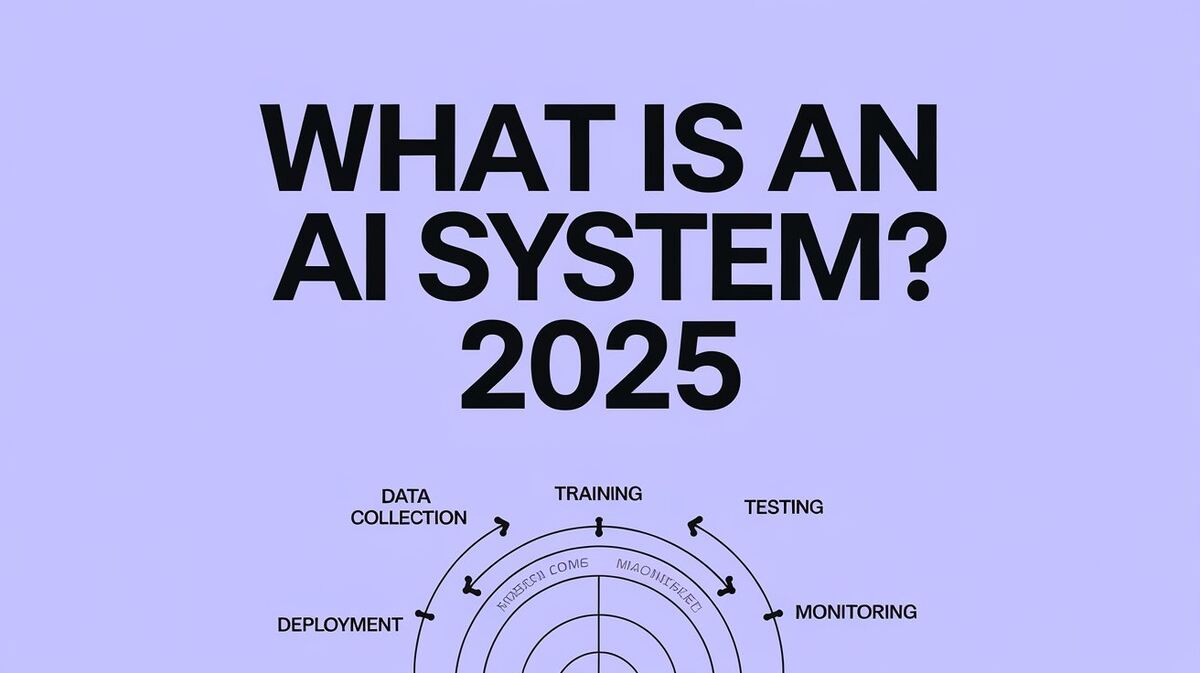Table of Contents
An AI system is designed to mimic human capabilities like decision-making and problem-solving but does it faster, more efficiently, and often with more accuracy. For real estate professionals, understanding these systems can transform how you manage properties, analyse markets, and improve client experiences. This post explores how AI systems work, their real-world applications, and why they’re becoming essential in modern business. You can also learn about the ethical considerations surrounding AI systems or discover practical steps for integrating AI into your real estate business.
Understanding AI Systems
Artificial Intelligence (AI) systems are the backbone of modern technological advancements, driving efficiency and innovation across multiple industries. If you want to make the most of AI in real estate, understanding the basics of these systems is essential. Let's break it down into manageable insights below.
Definition of an AI System
An AI system refers to a combination of software and computing mechanisms designed to simulate human-like decision-making, learning, and problem-solving. These systems can process large volumes of data, identify patterns, and make predictions or decisions without constant human intervention. In simple terms, an AI system is like having a knowledgeable assistant that never tires and keeps learning.
Real estate professionals can utilise AI systems to optimise processes like property valuation, market analysis, and even client communication. The efficiency brought by AI systems supports smarter, data-driven decisions.
For more on the possibilities AI offers, you may want to check out Machine Learning Demystified: A Property Pro's Guide to AI's Superpowers.
Components of AI Systems
Every AI system is built from several essential components that work together seamlessly. Here’s what goes into making these systems functional:
- Algorithms: The mathematical recipes that process input data. Algorithms define how an AI system learns and performs tasks.
- Data: The lifeblood of any AI system. Think of data as the experience from which the system learns and improves.
- Computing Power: This is the engine that drives it all. Advanced hardware ensures that the system can handle complex calculations and massive datasets efficiently.
Each of these components plays a vital role. For instance, in real estate, an AI system might use data from the housing market, algorithms to predict trends, and significant computing resources to deliver insights in real time.
Types of AI Systems
Not all AI systems are created equal. They are often classified into types based on the kind of tasks they perform or how they learn. Below are the three primary kinds you should know about:
- Machine Learning (ML): This type of AI uses algorithms to learn and improve from data. It's widely used in predictive tools like pricing models for real estate.
- Deep Learning: A subset of ML, this involves neural networks that mimic the human brain. It’s particularly helpful for analysing unstructured data, such as images or videos of properties.
- Natural Language Processing (NLP): If you’ve ever used a chatbot or voice assistant, you’ve experienced NLP. It enables systems to understand and interpret human language, offering possibilities like automated client communication.
To dive deeper into these AI types, read Future-Proof Your Business: A Property Pro's Guide to AI Terminology.
Each type has specific applications, but they often work together to deliver comprehensive solutions for real estate professionals. From automating routine tasks to providing nuanced customer insights, the potential is vast.
The Role of AI Systems in Real Estate
AI systems are reshaping real estate by introducing smarter, data-led solutions for property professionals. Whether you're assessing property values, predicting market shifts, or streamlining property management, AI offers powerful tools that simplify complex processes and enhance accuracy. Let's explore how AI is making its mark on the real estate industry.
AI in Property Valuation
Determining a property's value can often be a complex and subjective process. AI systems take the guesswork out by analysing vast quantities of market data, recent sales, and economic trends. These systems use data-driven insights to provide consistent, precise valuations, significantly reducing human error and improving fairness.
By incorporating automation, AI can assess both tangible and intangible property aspects more efficiently. For example, it evaluates historical data, nearby property values, and even details like local infrastructure or school ratings to generate an accurate valuation.
For a deeper dive into this topic, check out Unlocking the Power of Artificial Intelligence in Real Estate Valuation.
AI for Predictive Analytics
Imagine knowing how property demand will shift before it happens. AI systems excel at forecasting market trends by analysing historical data alongside real-time economic indicators. These predictive capabilities enable investors and developers to make informed decisions about property purchases, rental rates, and future market performance.
AI-powered predictive analytics tools can consider variables like population growth, interest rates, and urban development plans to model potential outcomes. This not only gives you a competitive edge but also mitigates risks by providing clearer market visibility.
Curious about more ways predictive insights benefit real estate professionals? Explore related applications in articles like From Reactive to Proactive: Leveraging AI for Predictive Maintenance in Commercial Properties.
AI in Property Management
Managing properties can feel overwhelming, with tasks ranging from tenant communication to maintenance scheduling. AI systems streamline these processes, making property management more efficient and less stressful. AI tools like chatbots can handle routine tenant requests, while smart scheduling systems predict when repairs or maintenance are due.
What's more, automated data collection and reporting offer property managers valuable insights into tenant trends and operational efficiency. This proactive approach frees up time and ensures your properties are running smoothly without constant hands-on management.
If you're interested in seeing how AI transforms property management, read How AI is Transforming the Landscape of Commercial Real Estate for practical examples and insights.
Benefits of AI Systems
The integration of AI systems into business processes has created new opportunities to improve efficiency, make smarter decisions, and reduce costs. For real estate professionals, these benefits translate directly into enhanced operations, better insights, and significant savings.
Increased Efficiency
AI systems excel at automating repetitive tasks, allowing you to focus on work that truly matters. From data entry to scheduling, AI takes over the heavy lifting, eliminating the risk of human error. Imagine having a digital assistant that can process tenant requests, update listings, or manage bookings without interruptions.
Additionally, AI tools streamline workflows by learning and optimising processes over time. For instance, property management platforms equipped with AI can automatically handle maintenance scheduling or tenant inquiries, saving countless hours. Curious about how this works? Explore Using AI to Craft Exceptional Tenant Experiences in Commercial Buildings to see how AI enhances processes.
Enhanced Decision Making
AI systems thrive on data analysis, transforming overwhelming amounts of information into actionable insights. Whether you’re analysing market trends or assessing the potential of a property investment, AI provides clarity. These systems identify patterns and predict outcomes, empowering you to make informed choices based on solid data.
For real estate, these capabilities include predicting property values or forecasting market trends. Imagine having the ability to make quick, precise investment decisions. Take a deeper look at related strategies through Using AI to Predict Future Rental Rates in London, UK.
Cost Reduction
The automation offered by AI systems is not just about doing things faster—it’s also about doing them more affordably. By reducing the need for manual intervention, businesses save on labour costs. In property management, for example, AI chatbots can handle tenant requests around the clock, cutting the need for full-time customer service roles.
In operations, AI identifies cost-saving opportunities by optimising resource allocation. Whether it’s energy-efficient building management or targeted marketing campaigns, AI ensures your resources are used wisely without waste. For more insights, take a look at AI Use Cases in Real Estate, covering practical applications that drive savings.
AI systems are transforming the way businesses function, with clear benefits across efficiency, decision-making, and cost-effectiveness. These advantages are particularly valuable in dynamic industries like real estate, helping professionals gain a competitive edge.
Challenges of AI Systems
While AI systems offer incredible opportunities, they also bring a unique set of challenges. As a real estate professional, it’s crucial to understand these difficulties to ensure you utilise AI effectively and responsibly. Below, we explore key challenges that AI systems face today.
Data Quality and Bias
AI systems rely heavily on data. If the data fed into an AI system is incomplete, outdated, or biased, the outputs will reflect those flaws. Think of it like using a faulty ruler—it doesn’t matter how advanced the tool is if the basic measurement is wrong. For example, in real estate, biased data could lead to unfair property valuations or exclude certain demographics in market predictions.
Bias often sneaks into systems through the training datasets, reflecting societal inequalities or errors from human input. This can impact fairness and accuracy, particularly in processes like tenant screening or pricing analysis. Ensuring high-quality, unbiased data is an ongoing challenge, but it’s essential for building trust and ensuring legal compliance.
For more detailed insights, check out What are the Limitations of AI?: Technical, Ethical, and Social Challenges.
Ethical Considerations
With great power comes great responsibility. AI offers immense potential, but its deployment raises ethical questions that cannot be ignored. From privacy concerns to decisions around transparency, every AI implementation should consider the broader implications on society and individuals.
For real estate, issues like data privacy in tenant communication or AI-driven decision-making in lending processes are at the forefront. You also have to consider how AI could inadvertently reinforce discrimination or create unequal opportunities. Balancing innovation with responsibility requires foresight and continuous evaluation.
Dive deeper into this topic with AI, Ethics, and Sustainability in Urban Planning: Striking a Balance.
These challenges highlight the importance of a thoughtful, deliberate approach when integrating AI systems into your real estate business.
Future of AI Systems in Real Estate
As technology races forward, artificial intelligence systems continue to transform the real estate industry. From simplifying complex market forecasts to automating repetitive tasks, AI is already playing a major role in your ability to offer enhanced client services and operational efficiency. But what’s next? Understanding both emerging technologies and shifting regulations can help you prepare for the future of AI in real estate.
Emerging Technologies: Explore new technologies that could impact AI systems
Advancements in AI systems often stem from innovations in underlying technologies. You might soon see real estate professionals relying on breakthroughs that make current AI applications look basic in comparison. Here’s a snapshot of emerging tech trends poised to revolutionise real estate:
- Quantum Computing: This cutting-edge approach promises to take AI performance to a new level. By speeding up data processing, quantum computing could allow even deeper insights into property markets or neighbourhood trends. Imagine getting forecasts that are more accurate and almost instantaneous.
- AI-Powered IoT Devices: Smart homes are evolving. Connected devices, such as smart thermostats and voice-controlled assistants, are learning to work seamlessly with AI systems. This creates opportunities for real estate professionals to offer more insightful property evaluations and streamline tenant needs.
- Generative AI: Tools that generate content—like virtual property tours, automated floor plans, or digital staging—are already sparking interest. Generative AI could soon allow you to create customised marketing campaigns tailored to each listing without much manual input.
The integration of these technologies will likely push the boundaries of what’s possible, giving you hyper-precise tools for decision-making and client services. Consider how combining AI-driven predictive analytics with IoT data could reshape your approach to investing in smart cities.
Regulatory Changes: Discuss how legislation might affect AI applications in real estate
Regulations often struggle to keep up with technology. However, with the growing adoption of AI systems, authorities are focusing on defining rules to ensure ethical use. For you, keeping an eye on these changes is essential to stay compliant and avoid unexpected liabilities.
Take, for example, the EU AI Act, a regulatory framework aiming to categorise AI systems based on their risk levels. Real estate applications like tenant screening or automated pricing models might be considered high-risk processes, requiring transparency and strict testing for bias. Understanding how this regulation will affect your real estate AI systems is crucial. You can explore the specifics through Navigating EU AI Act Compliance for Real Estate Professionals.
Other trends, such as evolving data privacy laws, could also influence how you collect and use tenant or property data. Regulations like GDPR already place limits on data handling, and stricter compliance measures may emerge as AI becomes more widespread. These changes highlight the importance of building systems that are transparent, fair, and built with accountability in mind.
As AI continues to expand its capabilities, being aware of technological and legislative shifts will ensure your AI systems remain effective and compliant in an ever-changing real estate market.
Conclusion
AI systems represent a significant step forward for those in the real estate sector, combining efficiency, accuracy, and innovation. They simplify complex tasks like property valuation, market forecasting, and tenant management, freeing up your time to focus on strategy and client relationships. By integrating AI, you can make smarter, data-driven decisions and stay competitive in a rapidly evolving market.
As you consider adopting these systems, ensure you address challenges like data bias and ethical implications, which are critical to building trust and long-term success. The benefits outweigh the initial hurdles, offering opportunities to improve service quality and operational efficiency.


